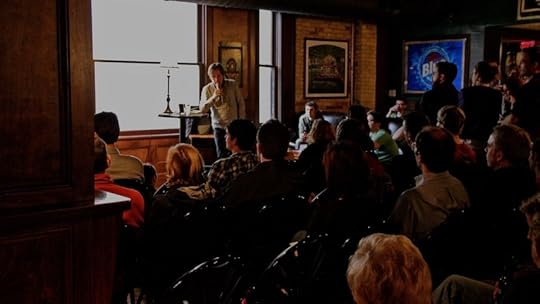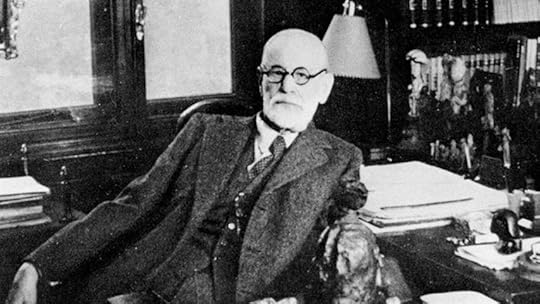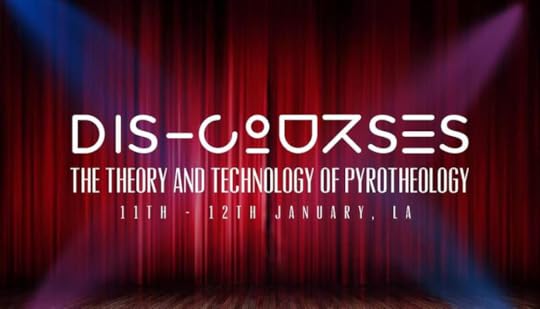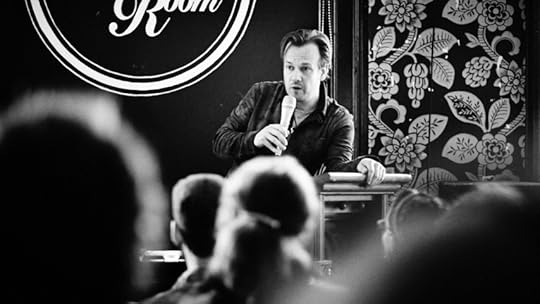Peter Rollins's Blog, page 13
December 1, 2015
Mince Pies, Mulled Wine and Theological Mayhem, Belfast, NI

Join me for an evening of mince pies, mulled wine and theological mayhem in my hometown of Belfast. This will be an intimate event where I’ll be interviewed by two friends/antagonists (Sarah Williamson and Ian Mitchell) who know my work and how it has evolved over the years. We’ll be exploring the boundaries of contemporary theology and providing plenty of space for questions and conversation.
I’ll also have a few books for sale as last minute presents for the ones you hate.
This will all be happening in a wonderful CS Lewis inspired cafe called The Lamppost (19 Upper Newtownards Rd, Belfast BT4 1PG). Event starts at 7:30.
There are only 40 spaces and will sell out so, if you’d like to reserve a place, email me here.
November 30, 2015
In the World but Not of it: Ideology, Demonic Possession and Exorcism

I’ve been reading Mary Daly’s Beyond God the Father as I prepare for my online Atheism for Lent online course . In it she offers up some fascinating insights into the realm of demonic possession and exorcism. In writing about the need for emancipation Daly writes about how oppressed groups suffer from a divided consciousness,
As contradictory, divided beings, the oppressed do not fully grasp the paralyzing fact that the oppressor, having invaded the victims’ psyches, now exists within themselves. They are caught in a web of of self-defeating behavior.
Because of this, truly revolutionary action requires that the oppressed realize that they are ‘in a real sense possessed by a demonic power within the psyche,’ and work to exorcise it.
Writing primarily about the suffering woman face in a patriarchal society, she notes that this exorcism is not something that happens in isolation. The battle against false consciousness requires solidity because the individual attempting psychic emancipation is immeshed in, and pitted against, too big a system,
The sense of reality that such an individual is trying to sustain would be pitted against a system with enormous resources for persuading her of her error, sinfulness or mental illness.
For Daly, the liberation of a part is ultimately liberation for the whole. Therefore standing up against the abuse of one particular group is a way of standing up for a world that is richer for everyone. While it is obvious that these demonic ideological forces actively destroy those who are not valued by the system, even those who have willingly sold their soul to the devil engage in a transaction that ultimately costs far more than it pays out.
So what do we do when we become aware of how we are inhabited, either willingly or unwillingly, with a demonic force?
The challenge involves creating cells that are in the world and yet not of it. Clandestine communities of disruption that engage in forms of communal exorcism. An exorcism that aims at tearing out that internal force that places us at odds with our own, and other peoples, liberation and freedom.
Oppressive ideology is not simply “out there” in the world. We are inculcated into it from before we have the ability to critically assess it. Just as we are born into the material world without having been consulted, we are born into an ideological world before ever being given an option. To cut against the various oppressive realities out in the world, we need to root out the power they have inside us.
Transformance Art is concerned with attempting to create collectives of exorcism that help to expose and extricate the ideology that lurks within us as an alien, deathly presence. Such micro-societies of subtraction are spaces where experiments in different forms of life and ways of interacting can be undertaken. In this way they act as draining sites, for they endeavor to unplug us from the oppressive ideologies that we inhabit. Ideologies maintain their power via our material participation, whether as active apologists, passive participants or perverse transgressors. To truly break free from the part of ourselves that has been invaded by a self-destructive spirit involves no longer acting as one of the batteries that feeds it.
This is something I’ll be exploring over two days in LA this January. If you’d like to join me, click here.
November 28, 2015
A Dark Night of the Soul with the Nightlight Switched on: Some Thoughts on Radical Theology and Emerging Christianity

I’ve just finished reading Katharine Sarah Moody’s excellent book Radical Theology and Emerging Christianity. In it she gives an brilliant overview of John Caputo’s Deconstructive Theology and Slavoj Žižek’s Materialist Theology, as well as the work of Kester Brewin and myself.
While the works of Caputo and Žižek have often been regarded as having an antagonistic relationship, Moody draws out how much their thinking overlaps and compliments each other. While noting some differences, her work draws out how they share much in common. A position that I also advocate.
In the second half of the book Moody explicitly turns her attention to my work and critically engages with it.
While she is broadly sympathetic to my project, Moody has one main concern which she explores in chapter nine. There she writes of how my work can reproduce a perverse logic in which one actively embraces doubt, questioning and even the betrayal of ones tradition, precisely as a means of ensuring that it stays pretty much the same (the transgression upholds the law).
While Moody sees this as more of a problem in my early work, particularity How (Not) to Speak of God, she notes that many people use that book as a type of Rosetta stone when approaching my later work. In this way, any potentially non-perverse readings of Christianity that one finds in books like The Divine Magician are obscured or domesticated.
To grasp her point we need only think of the many religious leaders today who advocate the embrace of doubt, ambiguity and complexity. But who attempt to frame this as is sanctioned, even celebrated by God. In other words, the argument is that one can doubt God precisely because God is still there and can handle it. My friend Jay Bakker once commented that this is like having a dark night of the soul with the night light switched on.
I can very much see Moody’s point here and think that she is putting her finger on an important issue. However, there is a sense in which my very expression of perverse reading of Christianity is employed precisely as a means of delegitimating it.
Naming a perverse structure is already a move to undermine it. Take the example of the “Don’t ask, Don’t tell” policy concerning homosexuality and the military. The point is that this policy named what was already the secret (perverse) position of the military. The act of actually naming it meant that what the perverse logic needed (its secret transgression) was stripped away. To name it explicitly was to undermine it and pave the way for greater equality. Once the ‘Don’t ask, Don’t tell” policy was put in place it was almost inevitable that it would collapse in on itself.
In a community where people are privately having all kinds of doubts, the work of shinning light on it is a step in the path to a religionless faith. Of course this is a little idealistic, as there are any number of people who are now affirming doubt on small things, while trying to make sure people don’t doubt the big things. But exposing the secret doubt and questioning makes it easier to expand upon it to the point that it puts everything under erasure. This is an act designed to reconfigure the perverse structure into a more productive neurotic one (one that openly questions and doubts its religious framework).
Once the institution is repositioned in this way, it is only a small step to help it move ‘beyond neurosis’ into a type of collective in which God as a Big Other is done away with and returns as the name given to the bond of the community given to the world.
An example of this can be seen in the work of David Bazan. He has noted that his very swan song to Christianity, the album Curse Your Branches, actually seemed to reveal to him the subversive heart of Christianity. As a young man he had harbored various doubts and questions, but there came a point when he pushed them as far as he could and as publicly as he could. Yet, in his attack of actually existing religion he found himself returning to an elusive liberating potential housed there. A move that Caputo would call a sensitivity to the event housed in the very name of Christianity.
My work has been an ongoing work of showing that this doubt and questioning, when taken absolutely seriously, collapses the religious structure rather than allowing it to remain. More than this, my more recent books have tried to show that this very movement is an act of fidelity to the subversive heart of Christianity. Not a fidelity to the religious structure we see today.
My argument in brief is that one should not read my later books through the lens of my earlier ones, nor the other way around, but rather see how they together chart a path through psychotic institutions (marked by certainty), past perverse ones (marked by secret doubt) into neurotic ones (where the institution openly embraces auto-deconstruction). And that this is all part of my wider project to express forms of community ‘beyond neurosis.’
November 25, 2015
Transgressions that Support the Law: The Perverse Nature of All Lives Matter

In the TV series The Fall, we follow the story of a serial killer in Belfast kills woman at night, and maintains a normal, happy family life during the day. While these worlds would seem to exist at opposite extremes, the killer is able to maintain them both with ease as long as the murders remains hidden.
What this presents us with is a type of perverse structure in which an individuals full immersion into some publicly acceptable world is sustained by a transgressive private world.
The perverse subject is one who is able to fully affirm the system they find themselves in because they have a secret, transgressive, outlet. Their full immersion in the system (the Law) is sustained by some form of activity not endorsed by the system (Transgression).
In Fifty Shades of Grey we see this structure play out in the figure of Christian Grey. Grey is an extremely wealthy businessman who is fully interpolated into capitalism. In contrast to some CEO who is visibly suffering from their immersion in the ideological game (stressed out, physically unhealthy, estranged from family), we have a figure who exhibits no symptoms. Grey is the ultimate counter-revolutionary figure because he is able to function so perfectly with the ideological values of the political system. Unlike a neurotic figure, who would exhibit suffering and doubt, Grey is unproblematically integrated into the Law. What we discover however, is that this integration is sustained precisely through his secret world of sadomasochism. While the BDSM lifestyle can function as a critique of contemporary society, here it is the very framework that enables the subject to more fully insert themselves into it. It acts as a type of yoga practice that enables the individual to reinsert themselves into the world.
One of the points that the philosopher Slavoj Žižek makes about contemporary society is the way that it places us in the position of perverse subjects (hence the word ‘pervert’ is used in the titles of two documentaries outlining his thoughts on this present age).
To understand this we can take the example of the secret societies that operate within elite universities in the UK. On the surface the values that are lionized in such places include sobriety, restraint, humility, and concern for those less fortunate. Yet there are various events where the very opposite of these values are celebrated and indulged in. Societies where drunkenness, arrogance, and sexual violence are encouraged.
While these secret societies might seem to be a place for those who reject the values and aspirations of the university, they are actually populated by individuals who affirm them and want to sustain them. Although such societies are officially denied or condemned, one often needs to be part of them if one has aspirations to become an establishment figure in the political, judicial or corporate world.
On the surface, the activities express the opposite of what the system values and upholds, yet to maximize ones chances of progressing within the system one has to be part of these groups. Those who stand against such activities are viewed with suspicion and are unlikely to be trusted.
The revolutionary move for those within a perverse structure involves finding ways of casting light on the constellation of acceptable transgressions that are going in within the system.
This can help us uncover the central problem with the All Lives Matter hashtag that arose in response to the Black Lives Matter movement. On the surface the former is simply a reiteration of the official standpoint of America; one that is positive and worthy of support. But this overt position of all lives mattering is inexorably coupled with a network of covert acceptable transgressions. One of which being that black lives don’t matter. This acceptable transgression is not expressed in words, but covertly operates in the institutional realities of the country (in education, policing, prisons, the legal system, etc.).
We are living within a perverse system in which affirmation of the official stance (all lives matter) involves acceptance, and even direct participation in, the disavowed unofficial transgression (black lives don’t matter).
The radical move here involves bringing to the surface the obscene secret that undergirds the perverse system so that it can be short-circuited. In Black Lives Matter, this obscene secret is brought up in such a way that it disturbs the smooth running of a system where some are valued over others.
November 23, 2015
Dying for a Cigarette: Ideology, Addiction and the American Dream

There was once a little white rabbit born and raised in a laboratory. One night he escaped and met another rabbit running around in a field full of vegetables,
“Hello,” he said, “Is this where you live?”
“Oh yes”, replied his new friend, “help yourself to the carrots”
“These are amazing, I’ve never tasted anything like them.”
“Oh this is nothing. Just wait till you see what’s in the next field.”
They hopped over and he was greeted by dozens of rabbits playing and having fun.
The little white rabbit played all day, then sat with his new friends and watched his first ever sunset.
As the sun disappeared, he got up to leave.
“Where’re you going?” said one of his friends.
“I’ve got to get back to the lab.”
“Why? You’ve all the food, freedom and friends you could ever want here.”
“Yeah,” said the little white rabbit with a sigh, “but I’m dying for a cigarette.”
—
I’ve often heard it said that the US is a deeply individualist nation where people tend to act in accord with their own self-interest rather than in some more collectivist way. The common perspective is that people in America are more likely to pursue their own pleasure rather than sacrifice themselves to some larger ideology.
But is this really the case?
In approaching an answer it’s interesting how the film Whiplash was viewed by many European critics. For example, in the French program Le Masque et la Plume the critics were bemused by the way the viewer was positioned in the film.
Whiplash followed the story of a young student who would sacrifice everything in order to win the respect of his music teacher. What’s interesting is the way that the director presents this young student as some kind of heroic individual. While this seemed to go down well in the US, the french critics saw him as a deeply tragic individual obsessively attached to an ideal that was destructive and pointless.
The young student was caught up in a situation in which he was abused, insulted and humiliated by a teacher who he frantically attempted to please. But rather than exploring how he might have freed himself from this destructive and rather pathetic situation (a type of death of the father narrative), or showing how problematic the situation really was, the director opts to valorise the students attempt to please the ideological Big Other (personalized in the figure of the teacher).
At the end of the film the student is able to finally make the Big Other respect him: he is able to elicit a small smile from the former teacher at the end of a concert. A small smile drawn from the impotent, bitter and aggressive Other who should have been dethroned.
Instead of exploring how he might have freed himself from his destructive obsession, the film celebrated his tragic immersion in it. Instead of freeing himself from the Big Other, he is presented as submitting all the more fully to it.
Living in the US I’ve encountered many who are frantically pursuing some form of the American Dream. A pursuit that fuels all kinds of anxiety, depression, and bitterness. The interesting thing about this situation however is that most of the people I talk with know that this pursuit isn’t good for them, that it doesn’t lead to happiness. Indeed, when asked how they’d prefer to live, many have freely told me that they’d like to embrace a more simple existence away from the unending demands of city life.
So why don’t they?
Why would they be so willing to keep sacrificing their wellbeing on projects that they don’t even believe will bring them happiness?
Why is it so hard for them to unplug from the American Dream, and why is this collectivist sacrifice so often experienced as its opposite?
The American Dream is an ideology that millions sacrifice their happiness, passion and energy to every day of their lives. In psychoanalytic terms it functions as a Master-Signifier: as a fundamental idea that lacks any concrete meaning, but that gives meaning to all our other ideas.
Like the rabbit in the opening story, we often experience moments freed from this ideology, yet we’ve been so inculcated into it that our addiction keeps pulling us back.
In the midst of all the messages we hear challenging us to pursue the American Dream, our challenge lies in the opposite direction. It lies in forming spaces that help us uncouple from the pursuit.
November 11, 2015
Freud’s Last Session

There will be a showing of the play Freud’s Last Session, followed by a panel discussion that I will be on.
FREUD’S LAST SESSION centers on legendary psychoanalyst Dr. Sigmund Freud who invites the young, rising Oxford Don C.S. Lewis to his home in London. On the day England enters World War Two, Freud and Lewis clash about love, sex, the existence of God, and the meaning of life, just weeks before Freud took his own life. FREUD’S LAST SESSION is a deeply touching play filled with humor and exploring the minds, hearts and souls of two brilliant men addressing the greatest questions of all time.
More information to follow
October 13, 2015
Vanishing Act of God: Gin, Theology and Magic

As many of you know I’m running a five week on-line course in November on The Divine Magician. This work (which is on sale for $1.99 on Amazon for Kindle) represents the culmination of a project I’ve been developing and deepening since How (Not) to Speak of God. It offers a radical vision of faith that critiques religion, subverts the distinctions between belief and non-belief, and presents Christianity as an incendiary counter-cultural commitment foreclosed by todays dominant sacred and secular institutions.
In this five week course we’ll carefully work through the book, exploring the rich constellation of theories and thinkers that inform it and discussing its practical application. Each 90 minute session will involve introductory remarks, a talk, and a Q&A.
I promised some gin pairings for the 5 weeks. Well here goes,
Week 1 – Nolet’s Silver Gin
To kick off I wanted something with an exotic and unusual taste that would bring to mind the Garden of Eden (which will play a big part of the first week). Distilled in small batches in copper pot stills, turkish rose, white peach and raspberry give this gin a soft floral aroma and delicate fruit-driven taste.
Weeks 2/3 – Monkey 47
I’m giving this gin two weeks because its story fits with the content of both sessions (the disappearance and reappearance of the sacred). This woody, heavy gin from the Black Forest was originally created by Wing Commander Montgomery “Monty” Collins in the aftermath of Berlin’s destruction in WWII. He’d been part of Germany’s destruction and wanted to be part of its rebirth. The story goes that the gin disappeared entirely from the public eye in the early 1960′s until the chance discovery of a dusty bottle accompanied by a letter containing the detailed description of the plant ingredients Montgomery had used in his original recipe.
Week 4 – G’Vine Floraison
This sweet, floral gin seems an appropriate way to celebrate our survival through the three acts of the magic trick. Produced in the French region of Cognac, G’Vine is infused with Ugni Blanc grapes, and includes ginger root, liquorice, cardamom, cassia bark, coriander, cubeb berries, nutmeg, lime and even a bit of juniper. It is vibrant, spicy and floral.
Week 5 – A beer of your choice in honor of our guest Tripp Fuller
In the final week you’ll get a rest from the gin as Tripp Fuller from Homebrewed Christianity joins us for some critique. I’ll let him give some appropriate recommendations for this closing session.
If you’d like to join me, just click here
October 2, 2015
Putting Pyrotheology Into Practice

In January I’ll running an intensive 2-day workshop exploring how to put my work into practice in real world situations. This event will provide a small number of people with the opportunity to engage directly with me and learn how to bring doubt, complexity and ambiguity into the heart of liturgical experience.
To help me with this I’ll be joined by some special guests with a rare mix of academic rigour and practical experience. I may add one or two more to the mix, but at the moment my guests are Barry Taylor and Xochitl Alvizo. Barry is a cultural theorist who runs an alternative church community in LA. He teaches Contemporary Theology at Fuller and Cultural Theory at the Art Center College of Design. Xochitl teaches at California State University, is co-founder of Pub Church in Boston and co-founder of Feminism and Religion. Both Xochitl and Barry have a profound understanding of my work and are experts in practical theology.
In addition to the full price tickets, I’m keen to offer some discount bursaries to church workers (pastors, youth workers, worship leaders etc.) who think they might benefit from two days with me, talking about actual existing communities. If that is you, then please drop me an email.
For more information, or to secure a ticket, click here
September 29, 2015
Crucifixion: Crossing out Meaning

http://peterrollins.net/wp-content/uploads/2015/09/Reflections-on-the-Cross-92915-9.02-PM.mp3
This is my part of a debate I took part in with Tony Jones about the meaning of the Crucifixion. Here I discuss Christianity as a rupture of meaning and critique the various conservative and progressive attempts to place the cross into a system. To listen to the whole thing, click here
September 25, 2015
Jesus: Unethical and Unwise

On Sunday 27th I’ll be giving a short talk in LA called “Jesus: Unethical and Unwise.” The reason for my interest in this subject is that, from the very beginning of Christianity, there has been a strong desire to see the figure of Jesus as a moral teacher or wise man. While this is especially obvious in progressive circles today, one even sees it taking place in more conservative communities. Parables are explained, sayings are viewed as insights, disturbing or contradictory ideas are massaged and reformulated to become coherent and sensible ethical teachings.
It was this approach to Jesus that sent Kierkegaard’s blood pressure through the roof. For him, Jesus was anything but wise, and the Christian faith was a spear thrust into the side of ethical thinking. He even spent an entire book, Fear and Trembling, exploring how the founding event of the Hebrew scriptures was impossible to grasp from the point of view of ethics and wisdom.
Kierkegaard was baffled about how the story of an old man obeying a voice inside his head telling him to kill his kid, could possibly be domesticated by religious professionals.
In protest, he disturbs his reader by getting them to think long and hard about how unethical and just plain stupid this act was.
What ethical teacher would tell a man to obey some inner voice telling him to kill his wife?
What wise guru would counsel a woman to poison her husband because she received a sign?
I don’t want to delve into Kierkegaard’s fascinating reading of Abraham and Isaac here, except to draw out how any progressive attempt to render bible stories like this one into some kind of wise and ethical text will always result in intellectual gymnastics, bad faith arguments and embarrassment.
If you are outside of the Islamic, Jewish or Christian traditions you might simply ignore the story, but what do we do if this story is fundamental to our tradition?
To approach an answer to this we can simply reflect on what happens when someone relays a dream in therapy. The dream is accepted by the analyst as reflecting something fundamental about the subject. It touches on some central conflicts, desires, fears etc. The dream might be nonsensical, disgusting, evil etc. but the analyst neither rejects it nor simply accepts it at face value. Rather she takes it very seriously and helps the one in analysis (the analysand) to discover something about themselves in it. A process that can be profoundly transformative.
The point of a psychoanalytic interpretation is not to make sense of the dream, to make it fit within the culturally acceptable wisdom of the day, or to domesticate it. It is there to help the analysand become surprised at themselves, disturbing their everyday understanding of their desire, and bring hidden traumas to the light of day.
To turn briefly to the little we know of Jesus, we discover that his primary means of communication is one that disturbs and surprises his listeners. He speaks in a way that confounds the beliefs and practices of the day and, in doing so, brings up tensions, violence and traumas that were previously lying unseen. His discourse, as I explore in The Orthodox Heretic, was a type of dis-course designed to send people off-course and onto a new course (something that has strong links with the meaning of ‘repentance’).
The problem I have with the idea of theological interpretation being concerned with making sense of obscure and disturbing elements of the text has a parallel to the crisis that occurred in psychoanalysis whenever psychoanalytic interpretations became better known to the general public (post WWII).
What therapists were finding was that individuals would come to the clinic with quite thoughtful and potentially accurate readings of why they did a certain thing, e.g. I find it hard to trust woman because I was abandoned by my mother.
The problem was that the interpretations were not actually evoking transformation. It was Lacan who argued that psychoanalysis had gone off track in thinking that interpretation in the therapeutic setting was about making sense of something. Rather it was more to do with disturbing and surprising the analysand, with bringing things to the surface, with reliving the past in the present within the theater of analysis etc.
In the same way I would argue that Progressive Christianity has taken a wrong turn in attempting to make the bible (or the ‘red letters’ of the bible) into some kind of ethical teaching or set of wise aphorisms.
This is the theological equivalent of CBT. A process that can be helpful in making small adjustments to ones life, but that doesn’t touch on the reasons for our symptoms, and doesn’t help us work them through at the level of the unconscious.
Instead we should interpret the parables and sayings of Jesus in ways that make them strange again, that cut against our understanding, and that bring hidden institutional traumas to the surface.
Why?
For the same reason that one does this in therapy. Because, in doing this work, we discover the dead parts of ourselves, the hurt parts, the angry and lonely parts. In bringing those to the surface as a community we will let them heal by touching fresh air, warmth and light. And, if we are patient, the results will be seen in communities more alive to the other, more involved in making the world a better place, more gracious, more loving, and more joyful.
Peter Rollins's Blog
- Peter Rollins's profile
- 314 followers



